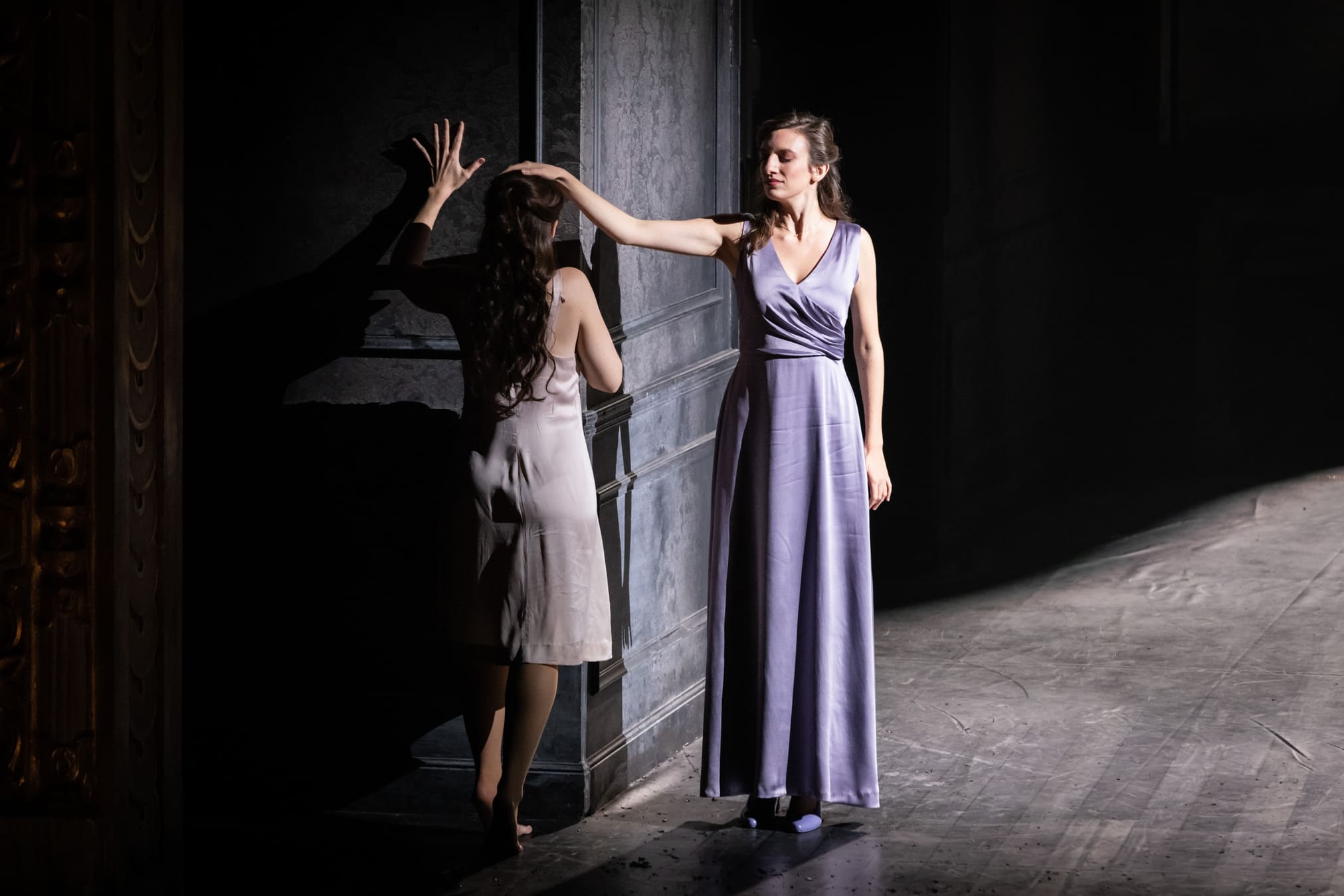
Crédit : Simon Gosselin
A thunderous Sémélé at the Opéra de Lille
06/10/2022 - Opera-online - Thibault Vicq
Barrie Kosky’s ten years at the helm of the Komische Oper Berlin have left a legacy of unforgettable productions, some of which he directed. In France, therefore, we are eagerly awaiting the arrival of all the productions from this recently ended era. His staging of Handel’s Sémélé (2018, seen streaming during the COVID months) lands at the Opéra de Lille, revived by David Merz, and it’s a complete strike!
Sémélé loves the god of gods Jupiter, who loves Sémélé. Semele is due to marry Athamas, whom Ino, Semele’s sister, silently cherishes. By abducting Semele so that she could benefit from his kingdom, Jupiter stirs up the jealousy of his wife Juno, who awakens the god of sleep, Somnus, so that she can take the bodily form of Ino in front of Semele: she convinces Semele that she will only achieve immortality through contact with Jupiter’s divine nature. Juno’s plan for revenge is complete when Semele is burnt to ashes by Jupiter’s lightning. Far lower down on Earth, Ino and Athamas finally share their joy at finally being a couple…
Natacha Le Guen de Kerneizon’s sumptuous set is the first highlight of the evening. In a space charred to its foundations, Sémélé emerges from a pile of ashes at the beginning of the opera. The charred blackness continuously marks the presence of Jupiter (both omniscient and invisible), and the blending of temporalities begins to take hold: Barrie Kosky begins with the end of the story (whose stakes he summarises in a few lines projected onto the curtain during the overture), and the action represented is set in the past. But is this not a curse that Semele harps on eternally in the solitude that follows her loss, or the cyclical legacy of the story of Ovid’s Metamorphoses (the source of this secular oratorio)? The disappearance of light beams in this black matter reinforces the suffocation of Sémélé’s enclosed space. Enclosed in these volumes, she can only glimpse the outside world through closed doors, a fireplace and mirrors reflecting light that is invisible to her. The narration of the spotlights (sublimely directed by Alessandro Carletti) weaves limpid links with the arrival and departure of the chorus and the characters, as well as with the tunnel through which the protagonist passes. It’s directly touching, beautiful and useful, richly directed. At first you think Barrie Kosky is overdoing it with the acting, but then you realise that a passion for love – the crux of the plot – is no longer passion if it becomes reasonable. The commitment of the cast is matched by a profound reflection on the volumes, culminating in a fusion of stage and pit that is so close-knit that one can no longer distinguish the individual contribution of the music or the reading. We are witnessing a complete collective work. Such a lesson in musical theatre is not so common in today’s opera market!
Much has been written about the invigorating sensuality of the Concert d’Astrée under Emmanuelle Haïm. Tonight, the musical work is carried out with just as much enthusiasm, but is shaped from a perspective similar to that of the visual process, always based on this still smouldering world of fire. The conductor makes the orchestral passages converge as the spotlights collide, sharpens the landing of phrases, and gives the textures a hardening roundness like volcanic rock. She clings to the earth, the very earth that Sémélé lacks in Jupiter’s sky. She makes us feel the finiteness of things and their potential for transformation through articulation and breathing. The continuo is inseparable from the energy of the orchestra, and the chorus delivers another top-notch performance.
The idea of artistic fulfilment is corroborated by a team of singer-actors each as admirable as the next. After Morgana at the Opéra national de Paris, Elsa Benoit confirms her mastery of Handelian heroines, where pure emotion coexists with friction, personality shifts and tenderness. Here, a disorientated compass, she builds a vocal backbone from a serum of invincibility carried by a mortal woman with boundless love. Stuart Jackson is the Jupiter of the suggestive and the explicit, brought together in the same dream: that of a titanic voice, with a broad vowel and an awareness of the whole, even in the skin of the enamoured human.
Victoire Bunel’s graceful vibrato traces the expressive pencil lines of her Ino. The line is invested over time, the voice is that of an intoxicating siren that we continue to listen to passionately, attracted by the storytelling facets and sparkling carats to which she gives free access. The countertenor Paul-Antoine Bénos-Djian is astonishing for the homogeneity of his timbre and the malleability of his atmospheres, Joshua Bloom skilfully portrays an incisive father like a devouring carnivorous plant, Emy Gazeilles-Pegliasco has the dapper temperament of Iris, and Evan Hughes (Somnus) pulls off his awakening bear act with flying colours. Lastly, the eccentric Ezgi Kutlu extends his lasso of elasticity to all Juno’s arias, for which his throne singing makes the virtues and basenesses grow with equal brio.
So we were really on cloud nine when we immersed ourselves in the Lille Opera’s season opener. There’s still time to share this little piece of paradise for a few performances and the ‘Sémélé ou la traversée des songes’ festival, which accompanies the show.